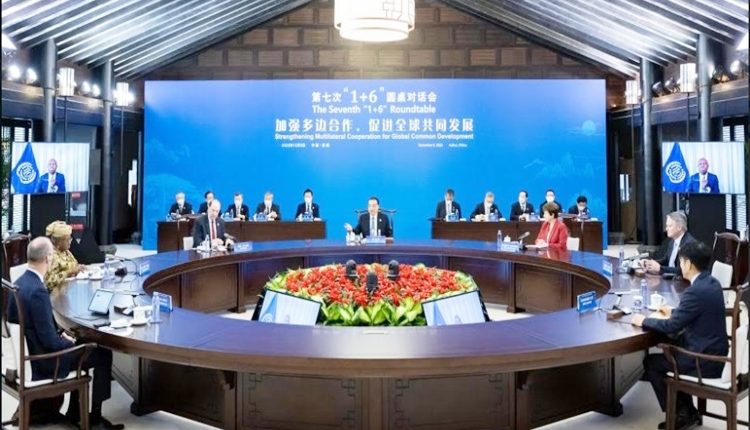IMF, World Bank chiefs urge China to accelerate and do more to ease the debt burdens on developing economies, discuss debt transparency
IMF Chief Kristalina Georgieva has urged China to accelerate and finalize the debt treatments for Zambia and Sri Lanka, which would allow for disbursements from the IMF and multilateral development banks while World Bank chief David Malpass said Beijing needs to do more to ease the debt burdens on developing economies.
The International Monetary Fund said this in a statement issued on Friday after attending the seventh “16” Roundtable convened by the Chinese Premier Li Keqiang in China’s Anhui province which was attended by heads of six major International Economic Organizations including President David Malpass of the World Bank Group, Director-General Ngozi Okonjo-Iweala of the World Trade Organization, Director-General Gilbert F. Houngbo of the International Labor Organization, Secretary-General Mathias Cormann of the Organization for Economic Cooperation and Development, and Chairman Klaas Knot of the Financial Stability Board. Officials from the People’s Bank of China, China’s finance ministry and China’s EXIM Bank and China Development Bank also attended the meeting. This was the first such in-person meeting since the pandemic began in December 2019.
According to media reports, the World Bank said in its readout after the meeting that Malpass asked Chinese officials to publish more data on debt instruments to help speed restructurings for poor countries. The World Bank said, “President Malpass and Premier Li held a detailed discussion on the burden of unsustainable debt levels in many developing countries.” Malpass called on China for its “active leadership” in addressing unsustainable debts and accelerating Zambia’s ongoing debt restructuring process. Malpass “also exchanged views on debt transparency, reporting and reconciliation, and comparability of treatment among official bilateral and private sector creditors in restructurings,” the World Bank said.
Sri Lanka has entered into a preliminary agreement with the International Monetary Fund (IMF) for an extended fund facility of 2.9 billion dollars to be disbursed over a period of four years, subject to a successful debt restructure programme and structural reforms. Much depends on whether or not China agrees to restructure Sri Lanka’s 7.4-billion-dollar outstanding debt to it. India and Japan, other two big lenders have held multiple rounds of discussions.
IMF readout quoted Georgieva saying that “We had a very fruitful exchange. We need to build on the momentum of the agreement on Chad’s debt treatment and accelerate and finalize the debt treatments for Zambia and Sri Lanka, which would allow for disbursements from the IMF and multilateral development banks.” She also discussed about how they can “prevent individual cases of debt distress from triggering a global debt crisis,” the readout said.
Zambia is trying to complete the restructuring of nearly $15 billion of external debt early next year and is “in active engagement” with China, its largest bilateral creditor, Zambia’s Finance Minister Situmbeko Musokotwane recently said. The IMF on Thursday urged default-stricken Zambia to strike a debt restructuring deal with its international creditors as soon as possible.
A readout from Chinese Foreign Ministry said heads of the international economic organizations noted that it is imperative to step up communication and policy coordination and work together to address global challenges such as climate change and debt issues. They welcomed China’s re-calibration of its COVID response, which they believed will give a boost to the recovery of the Chinese and global economy, the Chinese readout said.
China this week made major recalibration and optimization of COVID-19 restrictions carrying out large scale reduction in mass testing and allowing asymptomatic COVID positive cases to quarantine at home.
Premier Li said due to the pandemic and other factors beyond expectation, the Chinese economy experienced a notable decline at the beginning of the second quarter. He said China will take further steps to keep logistic channels unimpeded, ensure the steady operation of industrial and supply chains, and facilitate international exchanges and the flow of people.


Comments are closed.